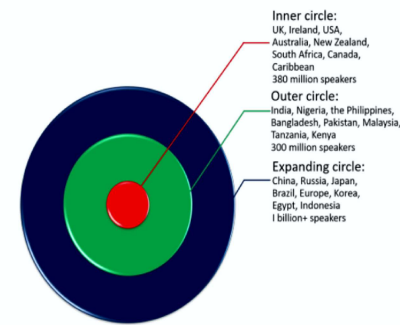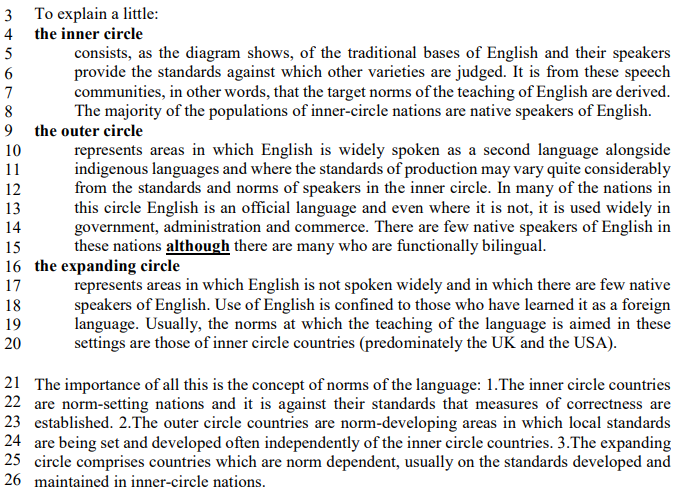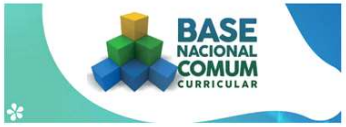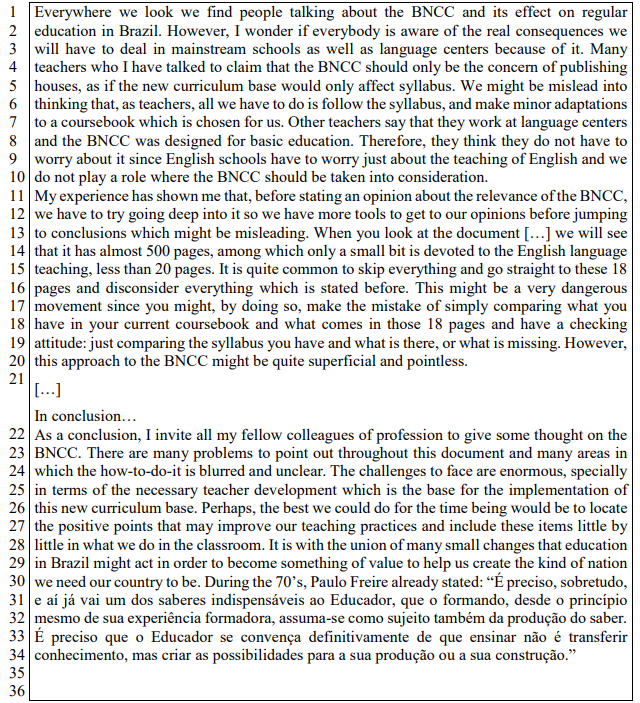Questões de Concurso
Sobre interpretação de texto | reading comprehension em inglês
Foram encontradas 9.754 questões
Judge the following item according to the ideas presented in text CG2A2.
Lower body mass index (BMI) is a guarantee of longevity.
Judge the following item according to the ideas presented in text CG2A2.
It can be inferred from text CG2A2 that sitting for more than
three hours a day does not have impact on life expectancy.
Judge the following item according to the ideas presented in text CG2A2.
Concerning longevity, the focus on obesity is a message that
should be revisited.
Judge the following item according to the ideas presented in text CG2A2.
According to the new study, a sedentary lifestyle is a more
relevant risk factor for health than weight.
Judge the following item according to the ideas presented in text CG2A2.
The study presented involved a million people over age 40.
Judge the following item according to the ideas presented in text CG2A2.
According to the article, to gain years in life expectancy after
age 40, it is mandatory to practice 75 minutes of physical
activity a day.
Because of the size of some of the plastic pieces found, the researchers believe that they probably could not have entered the patients’ bodies through their mouth or nose.
The text informs that microplastics were detected in the body of patients who died during heart surgeries.
The text suggests that the possibility of exposure to microplastics during surgery could increase the risk of heart disease.
Besides being in all places, microplastics were found, according to a 2022 study, in the human bloodstream.
Business professionals would prefer receiving data and practical insights in easily understandable portions, as opposed to having to search for answers within complex dashboards and reports.
The evolution of technology and the emergence of easier tools helped Business Intelligence to progress, and made analytics more accessible.
Embedded analytics do not allow users to get insights and take action at the same time.
Technical experts, who were previously called IT, had no influence in the construction of BI.
The promise that the Business Intelligence industry has made about workers being able to use data to make smarter decisions has already become reality.
TEXT III – Tema: As novas tecnologias na sala de aula de Língua Inglesa
Is Technology Taking Over Classrooms?

(Available from: https://citedatthecrossroads.net/eng101f13/2013/10/27/is-technology-taking-over-classrooms/ Accessed on July 8th , 2023)
I. The proverb “If you can't beat them, join them” means that, if someone/something is too strong for you to defeat, it is better to be on the same side as them.
II. Students are supposed to answer the test by their smartphones.
III. The teacher is familiar with the internet language.
Choose the CORRECT alternative:
TEXT III – Tema: As novas tecnologias na sala de aula de Língua Inglesa
Is Technology Taking Over Classrooms?

(Available from: https://citedatthecrossroads.net/eng101f13/2013/10/27/is-technology-taking-over-classrooms/ Accessed on July 8th , 2023)
TEXT II – Tema: Variação linguística no ensino-aprendizagem de inglês
INTERNATIONAL VARIETIES OF ENGLISH
1 The most familiar way to classify the varieties of English around the world was developed by
2 Kachru (1985) and looks like this:


(Available from: https://www.eltconcourse.com/training/common/variety.html Accessed on July 5 , 2023)
TEXT II – Tema: Variação linguística no ensino-aprendizagem de inglês
INTERNATIONAL VARIETIES OF ENGLISH
1 The most familiar way to classify the varieties of English around the world was developed by
2 Kachru (1985) and looks like this:


(Available from: https://www.eltconcourse.com/training/common/variety.html Accessed on July 5 , 2023)
TEXT I – Tema: O papel da Língua Inglesa na BNCC
IS THE BNCC REALLY GOING TO AFFECT MY CLASSES?
(by Lúcia Rodrigues Alves)


(Adapted from: https://www.luciarodriguesalves.com.br/is-the-bncc-really-going-to-affect-my-classes/. Accessed on July 1 , 2023)